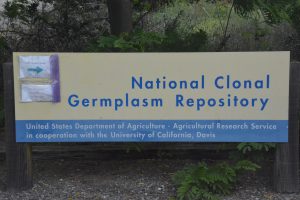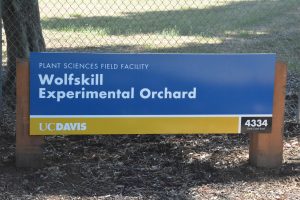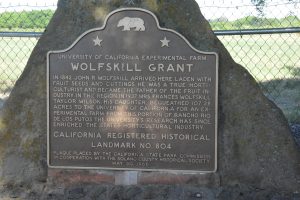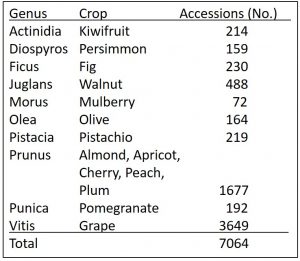Overview of the National Clonal Germplasm Repository in Davis, California
Gayle M. Volk, USDA-ARS National Laboratory for Genetic Resources Preservation, 1111 S. Mason St., Fort Collins, Colorado 80521
John E. Preece, USDA-ARS National Clonal Germplasm Repository, One Shields Drive, University of California, Davis, California 95616
Outline
- Introduction
- History and background
- Collections and curation
- References
- Additional information
- Acknowledgments
1. introduction
The USDA National Clonal Germplasm Repository for Tree Fruit, Nut Crops, and Grapes (NCGR) in Davis, California is part of the USDA National Plant Germplasm System (NPGS). The NPGS is a network of 19 plant genebank repositories that acquire, document, preserve, evaluate, enhance and distribute plant genetic resources (Byrne et al., 2018). The NPGS currently maintains about 600,000 plant accessions representing about 2,500 genera and 14,500 species (https://npgsweb.ars-grin.gov/gringlobal/query/summary). Plant genetic resources within the NPGS are available to research and breeding programs with over 250,000 accessions distributed annually. Each NPGS genebank location focuses on specific crops or mission components. NPGS inventory information is available on the GRIN-Global database (https://npgsweb.ars-grin.gov/gringlobal/search).
The mission of the USDA National Clonal Germplasm Repository for Tree Fruit, Nut Crops, and Grapes in Davis, California is to collect, preserve, evaluate, and distribute the genetic resources of the crops assigned as part of the U.S. National Plant Genetic Resources Program. Plant distributions are for research and breeding purposes. The NCGR maintains field crop collections of kiwifruit, persimmon, fig, walnut, mulberry, olive, pistachio, Prunus (almond, apricot, cherry, peach, plum), pomegranate, and grape. Additional information is available at the following website: https://www.ars.usda.gov/pacific-west-area/davis-ca/natl-clonal-germplasm-rep-tree-fruit-nut-crops-grapes.
2. History and background
Figure 1. Sign at the National Clonal Germplasm Repository in Davis, California. Photo credit: Gayle Volk.
The NCGR in Davis, California was established by the University of California, Davis in 1981 and was federalized in 1989. It is operated in coordination with the University of California, Davis. The Sacramento Valley of Northern California provides a Mediterranean climate with low relative humidity and low rainfall from April to November (Preece, 2020). The 30-hectare field collection at Wolfskill Experimental Orchard in Winters, California includes over 7,000 accessions representing 14 crops and 175 species of fruit and nut crops. The collections are mostly composed of older cultivars (heirlooms), breeding lines, and crop wild relatives.
Figure 2. Sign and plaque at the entrance to the Wolfskill Experimental Orchard in Winters, California. Field collections of the USDA National Clonal Germplasm Repository for Tree Fruit, Nut Crops, and Grapes in Davis, California are kept at this location. Photo credit: Gayle Volk.
 Figure 3. Aerial view of the Wolfskill Experimental Orchard in Winters, California. The collection is in the plots along the bottom of the image.
Figure 3. Aerial view of the Wolfskill Experimental Orchard in Winters, California. The collection is in the plots along the bottom of the image.
3. collections and curation
The field collections at the NCGR are generally well-adapted to the location’s environmental conditions. These collections require high levels of maintenance throughout the year, including pruning, repropagation, irrigation, weed control and mowing, pest and pathogen management, in addition to harvesting for plant distributions and research programs. On-site and collaborative research projects include plant breeding, phenotypic evaluations (including disease and pathogen resistance), and genotypic characterizations (Preece, 2020).
This eBook includes chapters devoted to each of the 10 genera in NCGR field collection.
Table 1. Crops and collections maintained in the NPGS Davis, CA field collection at Wolfskill Experimental Orchard.
4. references
Byrne P, Volk GM, Gardnew C, Gore MA, Simon PW, Smith S. 2018. Sustaining the Future of Plant Breeding: The Critical Role of the USDA-ARS National Plant Germplasm System. Crop Science 58:451-468.
Preece JE. 2020. The USDA-ARS National Clonal Germplasm Repository for Tree Fruit, Nut Crops, and Grapes, Davis, CA. USDA-ARS. Journal of the American Pomological Society 74(2):111-116.
5. additional information
Research Leader: Dr. Claire Heinitz, USDA-ARS National Clonal Germplasm Repository, One Shields Drive, University of California, Davis, CA 95616-8607, claire.heinitz@usda.gov
6. Acknowledgments
Citation: Volk GM, Preece JE. 2021. Overview of the National Clonal Germplasm Repository in Davis, California. In: Volk GM, Preece JE (Ed.) Field tour of the USDA National Clonal Germplasm Repository for Tree Fruit, Nut Crops, and Grapes in Davis, California. Fort Collins, Colorado: Colorado State University. Date accessed. Available from: https://colostate.pressbooks.pub/davisrepositoryfieldtour/chapter/introduction/
This training module was made possible in part by funding from USDA-ARS, Colorado State University, and the United States Agency for International Development (USAID).
Editors: Emma Balunek, Gayle Volk, Katheryn Chen
This project was funded in part by the National Academy of Sciences (NAS) and USAID, and any opinions, findings, conclusions, or recommendations expressed in such are those of the authors alone, and do not necessarily reflect the views of USAID or NAS. USDA is an equal opportunity provider and employer. Mention of trade names or commercial products in this article is solely for the purpose of providing specific information and does not imply recommendation or endorsement by the US Department of Agriculture.






